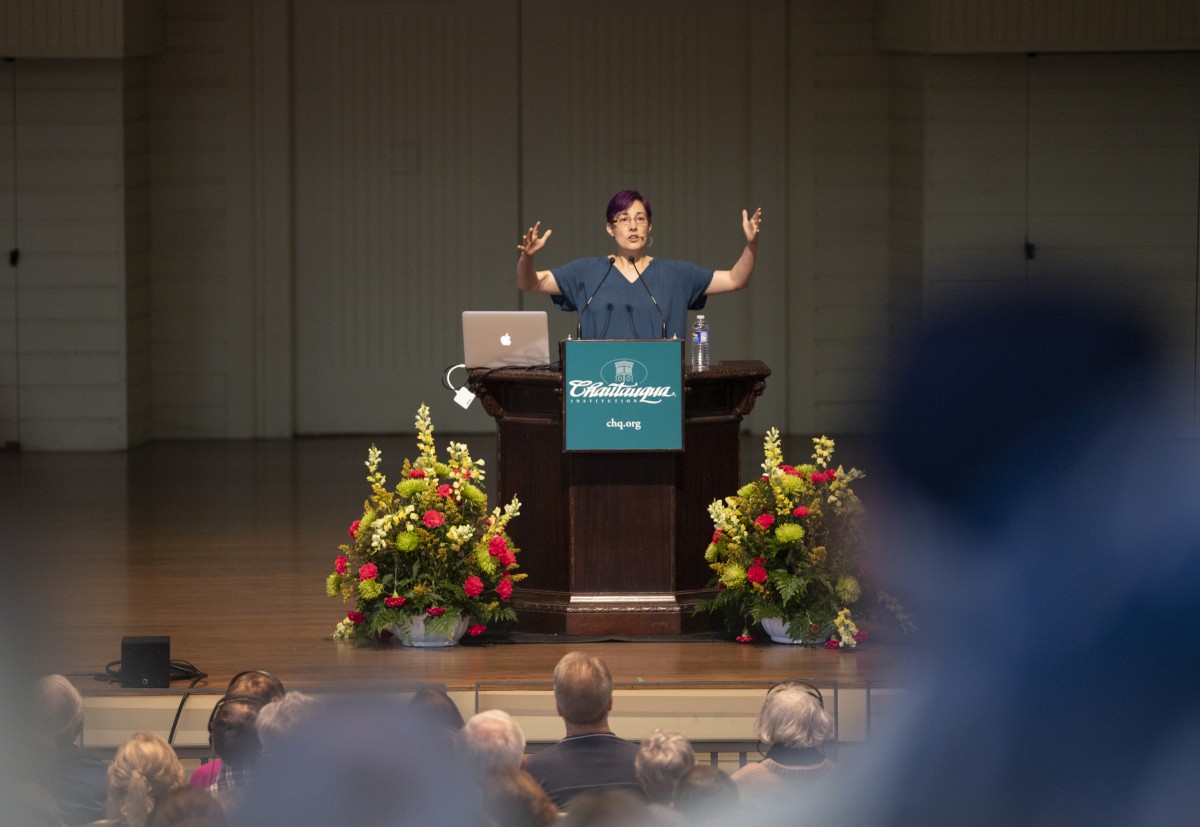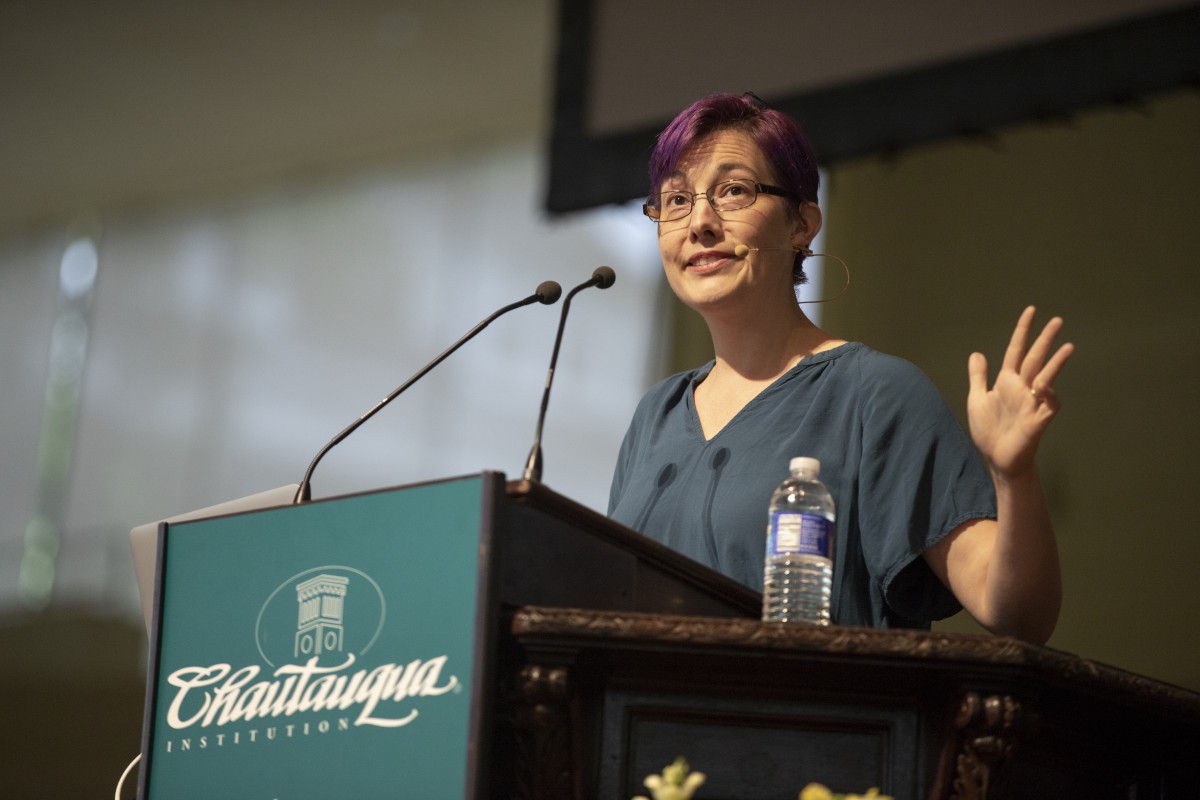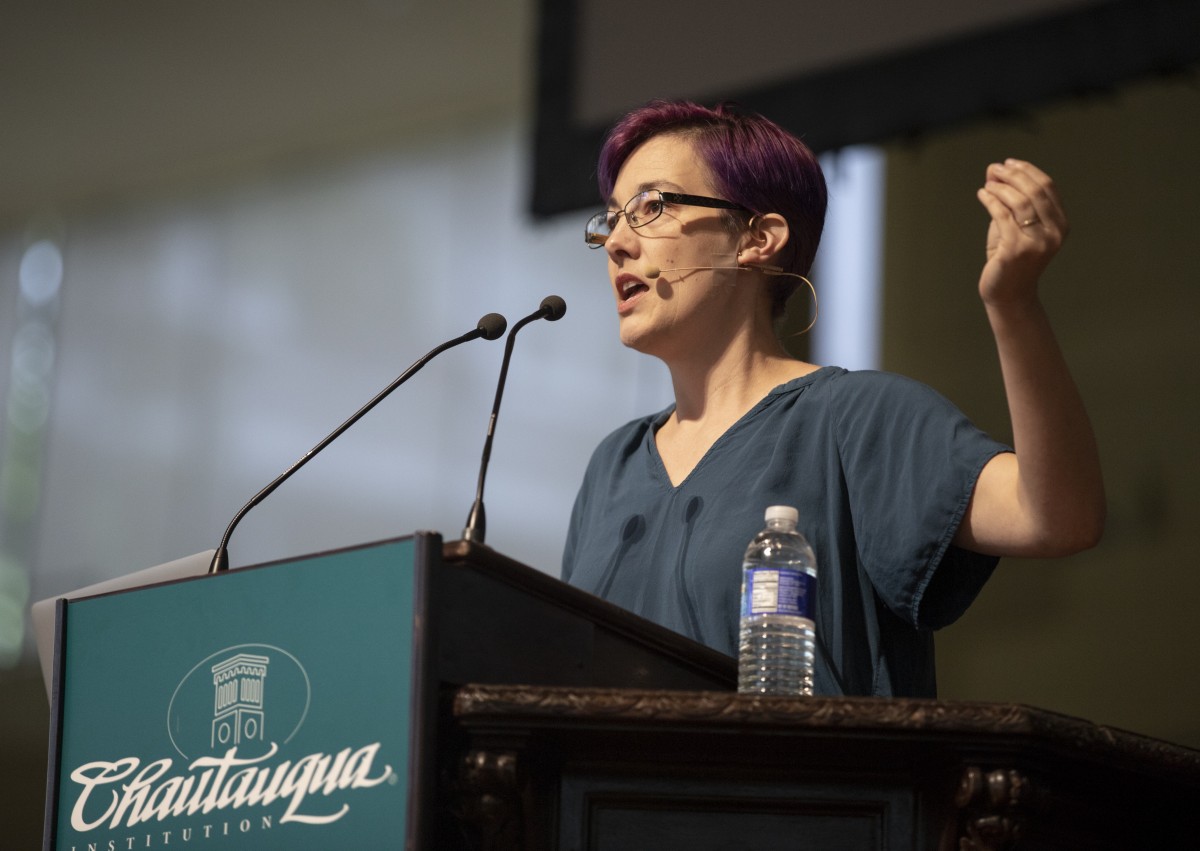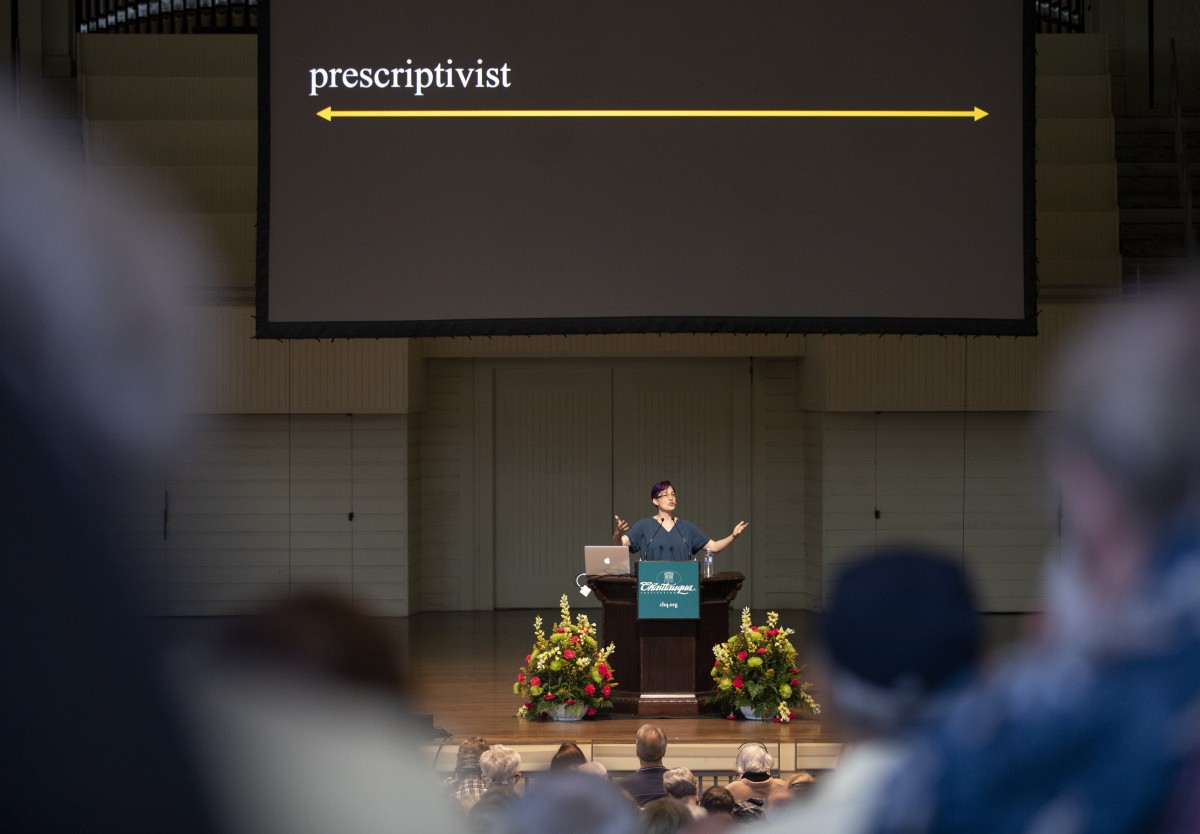As Chautauqua Institution gets ready to close the curtain on “The Life of the Written Word,” Kory Stamper pulled that curtain back to reveal the secret life of language.
The lexicographer delivered the morning lecture Thursday June 28 in the Amphitheater as the second-to-last-lecturer for Week One.
Stamper joined Merriam-Webster in 1998; she worked for the company for 20 years, and was responsible for explaining the “F-bomb” entry in the dictionary. Stamper is the author of Word by Word: The Secret Life of Dictionaries, and her writing has also been featured in The Guardian, The New York Times and The Washington Post.
Stamper opened her multimedia presentation with the definition of “lexicographer” — an author or editor of the dictionary.
“I did not write that definition by the way,” she said over a roar of laughter. “It was already there.”
But what does a lexicographer really do? It’s a question Stamper asks herself often.
“If you’re anything like I was, you didn’t even realize lexicography was a job,” she said. “I didn’t realize it was a job until I was hired to do the work. And when I started doing the work,I thought,‘Why? What do you mean dictionaries need to be written? We already wrote the dictionary.’ And then I thought, ‘How do dictionaries get written and what kind of person writes dictionaries?’ ”
And some of you are probably thinking, ‘They let you write dictionaries?’ ”
To be a lexicographer, reading is a must — compulsive reading is a bonus, Stamper said.
“I am in fact a compulsive reader,” she said. “I am not an avid reader; I’m not a voracious reader — I am a pathological, compulsive reader. I am the woman on the train who you see reading her receipts from her pockets if there’s a delay. That’s me.”
Lexicographers spend at least two hours a day reading, and it’s not just novels. Anything in print is up for grabs, according to Stamper — from beer bottles, to diaper boxes, bills, the Yellow Pages and menus — especially menus.
“When you’re reading, you’re not reading for content. I don’t read David Brooks’ column in The New York Times to find out what he thinks about our current economic situation, I’m looking at the word level, I’m looking for a brand new use of the word ‘voodoo’ in voodoo economics,” Stamper said. “So, I read compulsively, but remember nothing about what I’ve read.”
But although David Brooks might use the word “voodoo” in reference to economics, that doesn’t guarantee that definition will make it into the dictionary.
At Merriam-Webster, new words or new uses for words are flagged, and lexicographers must evaluate and decide if they merit an entry. To merit an entry, the word must have widespread, sustained and meaningful use.
Widespread use is both geographical and tonal.
“I want a word to be used in the Wall Street Journal and in Vibe magazine,” Stamper said. “I want to see a word that’s used in the The Washington Post and The New York Times Book Review and People magazine and on somebody’s blog.”
Sustained use is the second criteria.
“A word needs a shelf life to be entered into the dictionary because once a word gets into the dictionary, people tend to use it more, and it’s really hard to get a word out of the dictionary,” she said.
The final measure is meaningful use. Stamper clarified the distinction between “significant” and “meaningful” use.
“Of course, words have meaning, but not all printed words get used with a meaning I can grab onto. The word ‘antidisestablishmentarianism’ appears in print as an example of a long word, but it doesn’t mean a long word. Nobody would say, ‘He put a lot of disestablishmentarianism in his dating profile to attract women’ because that’s not what that word means,” she said. “In that case, ‘antidisestablishmentarianism’ does not have meaningful use.”
Language enthusiasts have two principles of thought: prescriptivist and descriptivist. Prescriptivism is “an approach to language that champions the best English,” according to Stamper. Most people would agree that dictionaries are “prescriptivists.”
Descriptivists believe that all language is equal — that there is no “good or bad English.”
“People that care deeply about language hate descriptivists,” Stamper said. “So, you will imagine my surprise when I discovered that dictionaries are descriptivists. The reason that dictionaries are descriptivists goes back to Noah Webster. He said, ‘Collect, arrange and define all the words in a language.’ And it’s not until you start doing this job that you realize the language goes in some really weird and ugly places.”
The audience erupted into laughter.
“If you’d like to get up and leave now, I won’t be offended,” she said, as the word “irregardless” appeared on the screen.
“Irregardless,” the most hated word in the English language, Stamper said, turned her lexicographic career upside down.
Stamper read an email, which she received from an upset consumer early in her career at Merriam-Webster:
“To whom it may concern;
As any educated Mississippian knows: ‘irregardless’ is the superlative form of regardless. Not used in lieu of ‘regardless’ as it states by y’all.
Regards.”
Dumbfounded by the thought of a nonsensical word appearing in the dictionary, Stamper went to work to prove this disgruntled reader wrong; unfortunately, she proved herself wrong — irregardless was in the dictionary and was used in abundance from the 1700s through the early 20th century, according to Stamper.
The audience burst into murmurs and gasps.
“Irregardless is a dialect term,” she said.
Dialects are subsets of language that people usually associate with accents but that also have their own grammar.
“There’s Southern English, then there’s whatever they speak in Boston,” she said. “There’s California English — there’s whatever they speak in Boston … everyone grows up speaking a dialect, in fact most of you speak multiple dialects and you switch between them easily, but none of you natively speak standard English.”
English is a written standard, a standard that grew out of the development of the middle-class and fall of the upper-class. To maintain their power, members of the upper-class clung to manners and language to assert their dominance — they pinned “elegance of language with elegance of mind and elegance of character.”
“Prescriptivism champions the best of English and what are the best practices — those that are right and correct and, you know, morally good,” Stamper said. “Then, clearly descriptivism, with its lack of attention to rules and boundaries and belief that anything in use in a language is fine is just too loosey-goosey and a little corrupt and must be morally bad.”
“I will remind you that dictionaries sit on the morally evil part of the spectrum,” she said. “So, you start your job as a lexicographer thinking that you are going to save the language, and it turns out that you are a hippie, liberal, pinko, commie nut job that puts ‘irregardless’ in the dictionary.”
The idea that the “best practices of English are morally right” is how people have come to assume that certain dialects are associated with lack of education.
But practices of poor grammar are not exclusive to the “uneducated” — Shakespeare was a grammatical mess, Stamper said.
“Verb to nouns — uncle is not a verb nor is grace — pronoun problems, subject verb issues in Julius Caesar,” she said, rattling through a list of errors on the screen. “Nope … not correct … double negatives …”
The best practices of English are not static. One-hundred and fifty years ago, the phrase “the house is being built” was considered incorrect; the structure “the house is building” was preferred, Stamper said.
Instead, she said, think of the English language as a child.
“You ask them as unruly teenagers, ‘Can you just clean this up a little bit, can you get rid of “irregardless” no one needs to see that,’” Stamper said, “and the language slumps in its chair and writes ‘irregardless’ all over its arms with ballpoint pen and says that you’re ruining its life, and it goes to its room and listens to moody music in the dark.”
Stamper reiterated themes from throughout the week like inclusivity,which Lisa Lucas stressed in her morning lecture Wednesday June 27 and the power of words from Tyehimba Jess on Tuesday June 26.
“The glorious thing about English is that it is by design inclusive,” she said. “No one person has any say over the language. I don’t get to say where the lan- guage goes, we all together get to choose where the language goes; it is a truly democratic institution in that way.”
To close the lecture, Stamper left those who criticize younger generations for ruining language with the words of Wendell Berry:
“Be joyful though you have considered all the facts.”
After the lecture, Vice President of Marketing and Communications and Chief Brand Of cer Emily Morris opened the Q-and-A with what words Stamper thought will be added into the dictionary in 2019.
“Lexicographers make lousy clairvoyants,” Stamper said.
However, she did predict that new definitions of “collusion” would be added to Merriam-Webster.
When asked about accepting “they/them” pronouns, Stamper said that English is fluid and people will adjust as they did 700 years ago with the transition from the singular pronoun “thou” to “you.”
“It’s a really a matter of respect; it’s a matter of honoring someone’s decision — regardless, no irregardless — of what you might see,” she said.
Finally, Stamper assured she would “never say irregardless again.”









